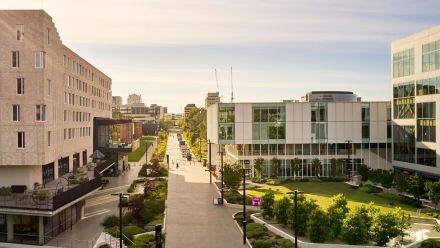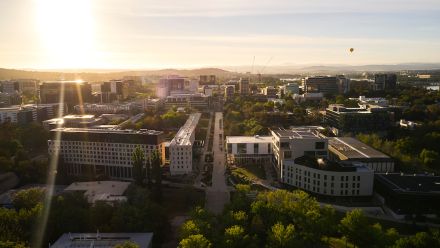ANU response to the UA-HRC report on sexual assault and harassment at universities
On behalf of the University I want to start by saying sorry. Sorry to any student, to any staff member, to any member of our alumni community who has experienced sexual harassment or sexual assault on our campus. One incident is more than we should accept.
I also want to say sorry to any student, to any staff member, to any member of our alumni community who has not received what they needed from the university in dealing with sexual harassment or sexual assault. We must – and we will – do better.
Every member of our community has a right to expect they will be safe in their place of study, their place of work, or – as this campus is for many – their home. And that they will have the support of the University when they disclose. And that we will make every effort to make sure our community understands consent. And that perpetrators will not be welcome in our community.
Our first priority right now must be to support survivors and all those affected by sexual harassment or sexual assault. To every member of our community who is affected, and who is suffering because of it, I say to you, you do have our support. We know this will be a traumatic period for you. If you are affected, please reach out to the support services on offer. We’ve made sure there is extra counselling for both students and staff available on the campus, including the specialist services of the Canberra Rape Crisis Centre.
This report gives us, for the first time, a real understanding of how sexual harassment and sexual assault affect university students. It is difficult reading. The stories told by survivors are shocking. The results are shocking. We should all be shocked. This level of sexual harassment and sexual assault is not acceptable in our universities, in our workplaces, in our city, or anywhere in our society.
The shock must be met with action. Action here at ANU, action across universities, and action across our entire community. And not something we do today but don’t do tomorrow.
To survivors and people affected by sexual assault and harassment, your voices and stories guide us to providing the right kinds of support, when you need it and where you need it. You are the catalyst of change.
I pledge to the students and staff at ANU who are affected by sexual assault and harassment that we are acting, we will do more, and we will not cease until this stops happening in our community.
ANU Results
I’m going to talk about what the statistics tell us about ANU. But before I do, I want to remind everyone that each statistic is a person. A colleague, a classmate, a friend. We need to remember that what we are dealing with here affects people we all know.
In all, 1,477 ANU students took part in the survey, one of the highest response rates in the country. For this I thank our students – institutions are only provided with findings for their institutions where there are enough responses to create a statistically valid sample. It is because our students were so generous with their time, so honest with their experiences that we know where we need to focus our efforts.
The sector-wide results tell us that students are more likely to be affected if they live in a residential college. That the overwhelming majority don’t report the harassment or assault. That the overwhelming majority don’t seek help. That men are also survivors of sexual assault and harassment. That LGBTQI students, Aboriginal and Torres Strait Islander students and students with a disability suffer disproportionate levels of harassment and assault.
At ANU the results tell us that
- Of those ANU students who responded to the survey, at least 116 were sexually assaulted in 2016, 52 of those on the campus.
- The sample size is too small for us to have been provided more detailed information that tells us whether students sought support, if they reported the assault, where the assault occurred and who the perpetrators were.
- Of those ANU students who responded to the survey, 841 reported that they had experienced sexual harassment in 2016, 517 of them at the university (excluding public transport). While women were overwhelmingly those subject to harassment, 183 male students are included in this number. This is higher than the sector average. 59 per cent of those incidents involved someone known to the student.
- In 74 per cent of those incidents, the perpetrator of the sexual harassment was another student and in five per cent per cent of incidents, a lecturer or a tutor. 82 per cent of harassment reports involved men as perpetrators.
- At least 620 students witnessed sexual harassment at the University last year, which tells us we need to step up efforts in bystander intervention.
- 61 percent of those incidents of sexual harassment involved inappropriate staring or leering, sexually suggestive comments or jokes, and intrusive questions about private life.
- The majority of these incidents - 65 percent - occurred on the university campus, in a residential college or university facility.
- At least 93 per cent of students who were subject to harassment did not seek support or assistance from the University. The reasons for not seeking support are overwhelmingly because students didn’t think the matter was serious enough (71 per cent) or because they didn’t think they needed help (58 per cent). The only positive is that only a tiny percentage - one per cent - were concerned that the University would not help.
- ANU students are above the sector average when it comes to having knowledge about where to get assistance in the University, with 56 per cent knowing where to get help.
ANU Response
The Human Rights Commission makes nine Recommendations to Universities. We accept all of them and will fully implement all of them.
The ANU student associations ANUSA and PARSA have also made a series of recommendations to the University. The University accepts the majority of these recommendations. Many of them are related to work already in place or commencing at the University. The University will work with our students through the new Steering Committee on the other proposals they have made, including exploring a restorative justice process for the University.
ANU Key Actions
We have commissioned independent research consulting firm Rapid Context to undertake an independent review of all policies and procedures related to sexual assault and harassment. This review will consult with staff, students and survivors, and provide the University with a report in September 2017.
We have appointed Donelle Wheeler, former diplomat and President of the Australian National Committee for UN Women as an independent chair of our campus-wide steering group for addressing sexism, sexual harassment and sexual assault on campus. Our group has a remit that covers our entire community of students and staff. That group will include students, professional and academic staff, senior leadership, residential college representatives and experts.
ANU has long term relationship with the Canberra Rape Crisis Centre and ACT Policing. That relationship has been extended to include a full-time presence of the Canberra Rape Crisis Centre on campus from August 7. Additional counselling has been put in place for staff and students in the meantime to deal with any additional demand as a result of the report.
ANU will conduct a full audit its counselling services and provide additional services where needed.
ANU will undertake a review of its residential colleges. It will invite affiliated residential colleges to participate in the review. Should any affiliated college opt not to participate, the University will commence review of the affiliation of that college with a view to determining if the affiliation will be revoked.
ANU piloted a new evidence-based and age appropriate consent training module with all incoming residential students in Semester 1, 2017. We are now working towards having all students complete consent training. So far, more than 2000 have completed the training.
A sister module for staff goes live this week. It trains staff on dealing with disclosures of harassment and consent.
The new ANU Strategic Plan for the first time articulates ANU values. The price of membership to our community is adherence to those values. All students and staff joining our community from 2018 will be advised of those values and the expected behavior that is aligned with those values.
The University launched a new website last month that is a repository for all information related to sexual assault and sexual harassment on campus. All students from Semester 2, 2017, receive direct communication making them aware of the values of the University and where to access information and support.


